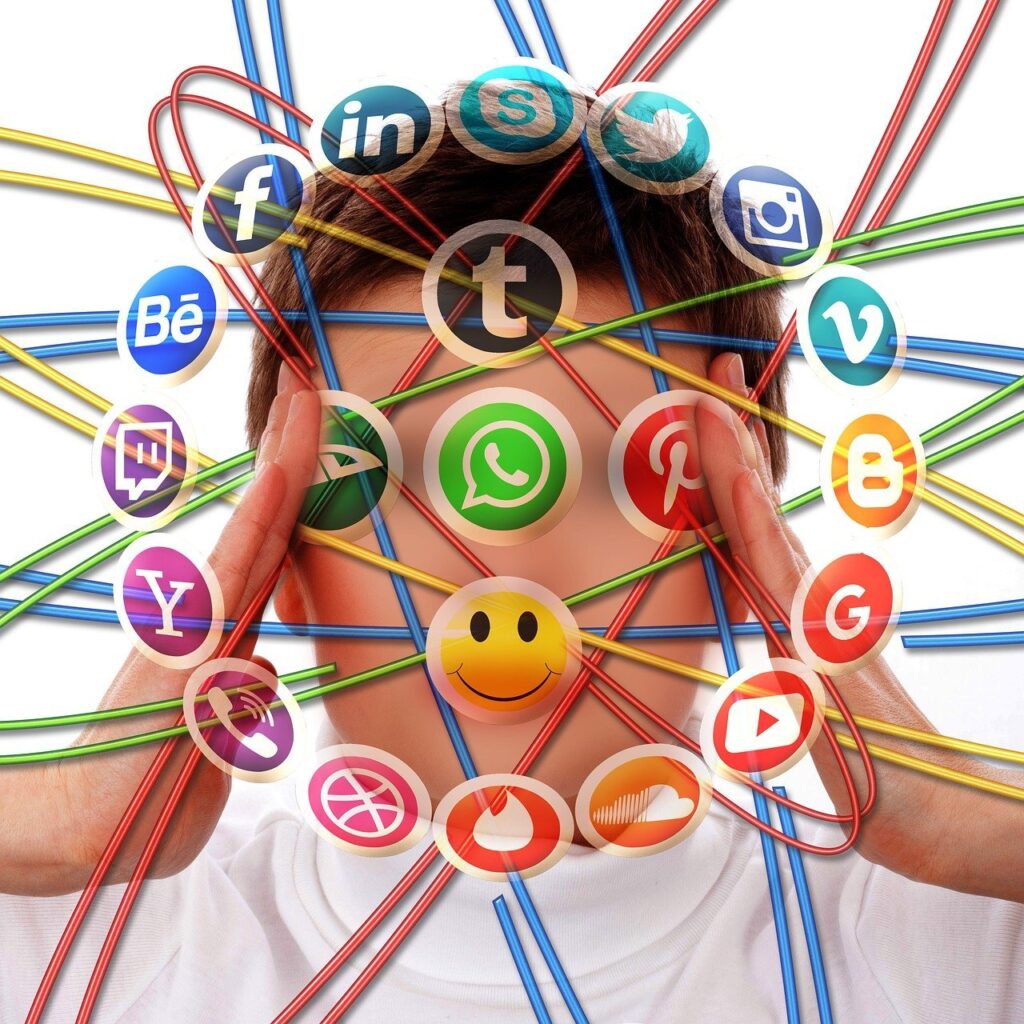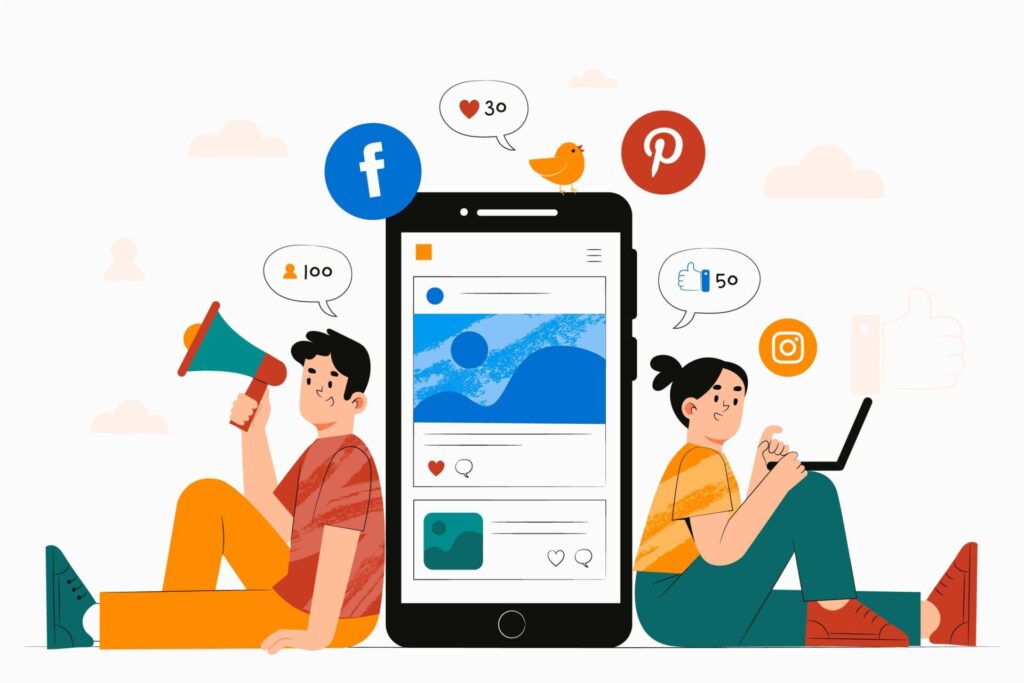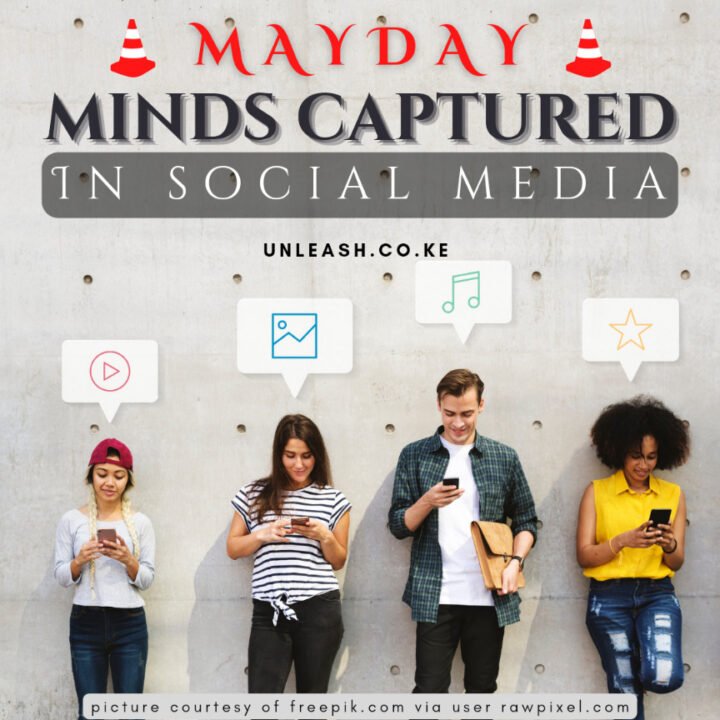Somehow the finger hovers over the screen, indecisive as a dragonfly of its next move, but ends up swiping and scrolling to the same spot, again!
Much like an obsession, whenever the hand gets a hold of the phone, the finger is overcome by an inexplicable frenzy, and all it wants is to dangle its way to the favorite spot.
Could be WhatsApp, Instagram, Twitter or Facebook; just a few spots for the trouble of mentioning.

Call it the obsession of the century. It’s got our faces bowed down, eyes locked onto screens and fingers dangling up-down, left-right, punching letters off of screens; all for keeping in touch.
But to what end, and at what cost? Keeping in touch at the cost of mental well-being, to say the least?
Two decades now since its break into the world of tech, social media has grown into a hypnotic overdog over its human subjects, persistently feeding on their time and attention.
It’s become easy, or perhaps normal to be ensnared in a loop, scrolling through feeds, stories and statuses; refreshing over and over; and switching between social media networks just to get in the hang of the latest stuff.
Harmless it may seem. It’s how the world vibes these days. Life; be it in jubilation, or gloom, it all unfolds on the web. Events break on the web, opinions and aggressions are voiced in it. The web has become life’s herald.
So if you wanna stay in the know, you’ve got to be where all the action is – social media. But more than keeping people informed, social media has built itself into a culture, and is now rapidly growing into a necessity of life.
State of capture
Consider how hard it can be to imagine modern life without social media. Take a look at every aspect of life; there’s hardly a place it hasn’t infiltrated – family, education, career, religion, politics, governance, and the many more.
It’s in every nook and cranny, so much that life devoid of social media today is far from imaginable.
If not already in it, humanity is slowly getting into a state of capture; a state of total dependence on social media.

Here’s some perspective: picture the emptiness your device would be without a hint of social media; without all the bickering and banter around trends on Twitter, or the steady stream of memes on WhatsApp Statuses.
How would it feel without the occasional wander into the pictorial world of Instagram, or the inescapable charm of lively reels on TikTok?
Imagine the feeling of desolation that starts creeping in whenever you’re disconnected even for the slightest hour, and the stubborn longing to get back on the web.
Wouldn’t it be accurate to say that social media wields control over humans like an overdog?
How many have tried getting off its hook; deleting accounts and uninstalling Apps, only to realise later that this was an effort too far-fetched and end up coming back?
Presently, how many feel trapped in its cycles of information and are unable to let go? Here and then, the question arises: exactly how much does social media control us, and how did we get here?
Birthed on a hotbed of possibilities
In our centuries-long search for better ways to communicate, finding a ground breaking medium such as we have today was inevitable.
From the primitive days of the printing press and newspapers, to the ingenuity of the telegraph, radio and TV, leading up to the PC and internet – the long search finally bore fruit.
The internet was the ultimate invention, a hotbed of possibilities, opening up unthinkable pathways. Social media was birthed on this hotbed.
It’s peculiarity was in handing a broadcasting megaphone to every one of its users, giving them the ability to reach the world.

Unlike the previous age of the printing press, where the privilege of publishing to masses was granted to professional authors, now everyone with a social media account could publish to a wide audience. Communication evolved from a ‘one to many’ model, into ‘many to many’.
Social media gave everyone publishing rights on a worldwide platform. In this, it exclusively worked out a solution to humanity’s social impulses.
A culture of sharing
Everyone has a voice, an experience, a piece of philosophy they want heard. There’s no better way to share, and engage with similar content, than through social media.
Building on this human want, social media and enabling mobile devices have cultivated a sharing culture in humans.
“What’s on your mind?” “Type a status.” “Create a story.” “Create a reel.” These are prompts we’ve all seen; seemingly benign persuasions to share a piece our world to the greater world.
But beyond mere prompts, they are pointers to the sharing culture, partly resposible for making social media a necessity of modern life.
That’s the long of it – how we got here. Now here comes the dark side; how social media is gaining control over our minds.
The dark side

In an effort to make good of social media’s popularity and great following, these platforms are being made hungrier for our time and attention.
With every new feature and algorithm, social media is becoming more addictive and controlling.
Take the case of WhatsApp Statuses: ever since they were introduced, you want to hang around more, view as many statuses as the eye can see. Unknown to many, this is an overwhelming load of information.
Case in study: assume each one of your hundred contacts on WhatsApp has posted a horde of statuses. In viewing them all, you’d have to process hundreds of small bits of information in a very short span of time, every day.
Chances are; you keep viewing these short statuses for an extended period of time, your attention span will start dwindling.
More than that, viewing other people’s lives this much often comes with comparison, the fear of missing out (FOMO) and thoughts of inadequacy, which easily spur anxiety and depression.
Not to forget reels and short videos; how they’ve been designed to satisfy and reward the brain in a span of seconds, leaving it drooling for more.
Oh, don’t even mention the algorithms, intentionally feeding users with posts that are likely to keep them engaged in an endless loop.
Take action

Well, here’s a piece of truth: the digital space today is highly unhygienic or toxic, as some would call it. Time and again, there’s need to evaluate its impact on our well-being, and if the slightest evidence of control over us, or overdependence on it is found, decisive action taken.
Action could be as little as carefully picking whom or what topics to follow and unfollowing others, to bigger steps like taking a break from the socials.
Make social media edify, make it work for you! Use it responsibly too.
In it all, the one thing no one should ever take for granted is: social media is powerful enough to edify or crumble down. Either way, it must be treated as gravely as it is powerful.


Quite a fascinating article on social media. I love it.
Thank you brother. It’s time we took control before total capture
A really well-thought-out piece. Love it!
Appreciated man! I hope it informs how you interact with social media